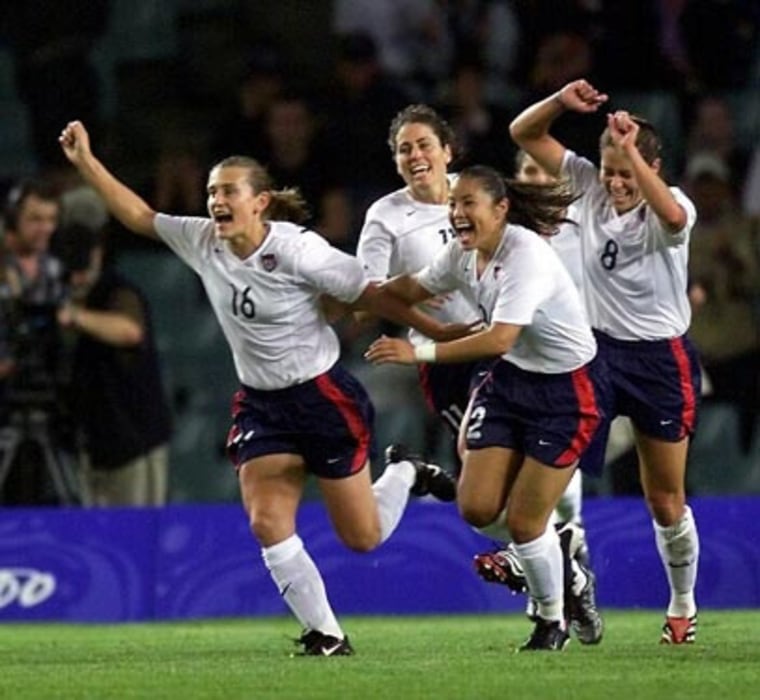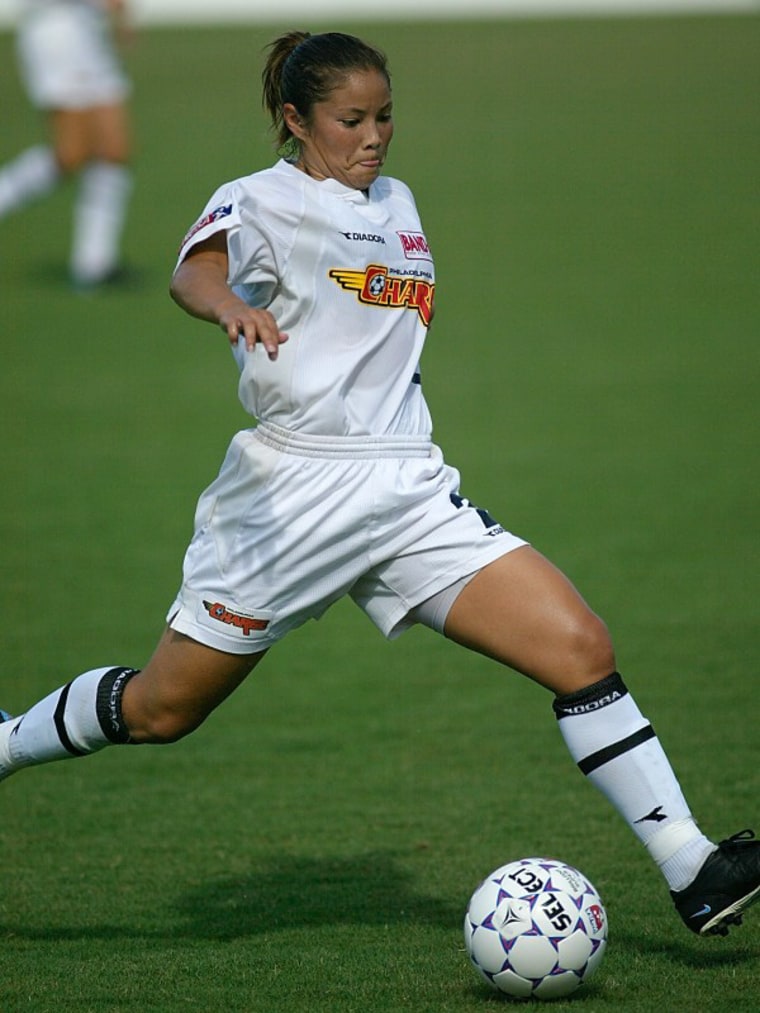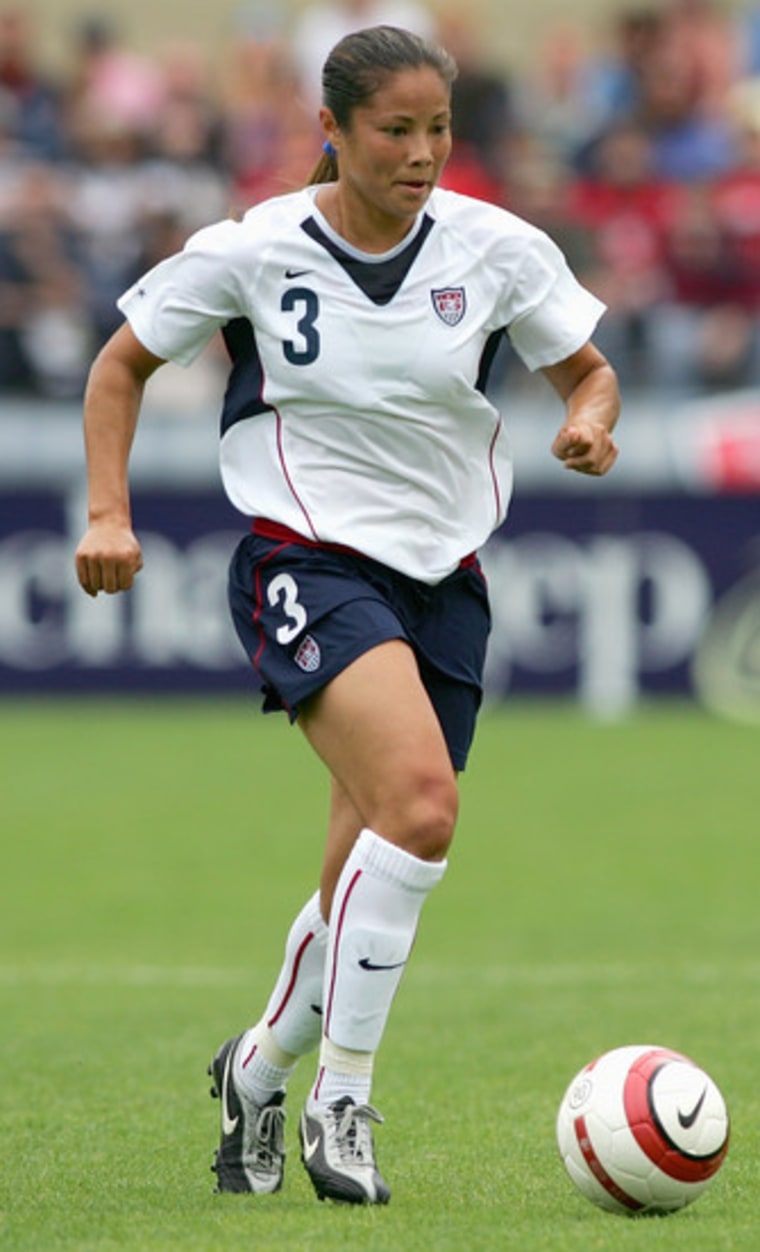When the U.S. Women’s National team won the World Cup in 1999, there was no ticker-tape parade from the Wall Street district to City Hall in New York’s famed Canyon of Heroes.
But Lorrie Fair, one of two Asian Americans (along with Tiffany Roberts Sahaydak) on a team that some believe began a revolution in women’s sports, doesn’t begrudge the 2015 champs at all their distinction as the first women’s sports team ticker-taped and paraded in New York.
“We were on the cover of People Magazine and had a parade through Disneyland,” said Fair in an interview with NBC News. “And there was confetti, but it wasn’t a ticker tape parade. Still, I love that people are honoring this team. It used to be, ‘Oh you watch women’s soccer?’ And you had to do it in secret like it was some cult following. But now so many girls are picking up soccer balls. It’s so mainstream.”
The audience for the 2015 televised final was more than 25 million viewers last Sunday. Fair believes that’s in part because the foundation had been set with the great U.S. women’s teams from the ‘90s, with Hall of Fame players like Michelle Akers and Mia Hamm.
Related: Women's World Cup Sets U.S. Television Ratings Record for Soccer
She said the 2015 team had more than lived up to the standard her team hoped to set.
“Just the mentality, the sense of pride of winning every ball, that’s what represents the U.S team,” said Fair. “It’s the mental toughness that no one is going to train harder, no one is going to beat us, period. And that’s why I think I was so nostalgic to see them win, because it reminded me of the old U.S. teams. That’s what we were known for being the best at for so long. To get to the top is easy. To stay on top is hard.”

It only took the women’s team 16 years to do it again.
“I was totally tearing up,” said Fair, who grew up playing soccer in a San Francisco suburb, and went on to play in one World Cup team and three Olympic teams. “I wasn’t outright bawling, but it reminded me of the amazing memory of winning in 1999. I was thrilled and happy for the players on this 2015 team. They’re going to have that memory forever. It was such a brilliantly played game.”
But now that they’re winners, champions and heroes, Fair hopes the 2015 champs would provide the impetus to address some important issues like the need for a stable women professional league in the U.S., and for pay equity at the highest levels of the international game.
Critics have pointed out that the women’s team got just $15 million for winning the World’s Cup, compared to the $575 million the 2014 Men’s champion received.
Related: For U.S. Soccer Women, Success Won't Bring Compensation Equality
Fair knows that fighting for pay equity is not easy. She said the women’s team actually walked out and refused to show up to camp in the mid-90s when it learned that out of every dollar to U.S. Soccer, women were only getting ten cents compared to 90 cents for the men.
That has since been rectified, but not at the FIFA level.

On the professional level, Fair was a founding member of the now defunct WUSA, and hopes a viable professional league emerges this time. But she’d be happy if there’s a steady stream of young girls exposed to the “beautiful game.” She said in other countries the game played on the streets is too often an upper middle class game in America, with club soccer shutting out many of the best players, many of all ethnic backgrounds.
“I think the club soccer scene is getting ridiculous,” Fair said. “Some simply can’t afford to play.”
Fair said what the 1999 team learned is whether you like it or not, as a world champion you’re an ambassador for women’s sports. She believes the 2015 champs have the same kind of power, maybe even more of it than the 1999 champs
“I think they have it,” said Fair. “Especially, if you win like they did. That’s the best leverage you have.”
Fair, who will be just 37 in August, was forced to retire from her playing career early due to injury. Now married, she has a seven-month-old baby boy, and continues to be an ambassador for the sport she loves, volunteering with the State Department on soccer trips around the world, including to Afghanistan. Her primary work involves funding community-based organizations in South Africa to fight childhood HIV, and she says, in her spare time, she manages to get physical playing beach volleyball.
But the national team is a big part of her soccer memories, from playing in one game with her twin sister Ronnie, believed to be a first, to the World Cup win in 1999.

The question remained, in a hypothetical match-up, or maybe in a video game—which team would be the ultimate victor? The ‘99ers or the ‘15ers?
Fair laughs at first, but doesn't hesitate with an answer.
“I’m going to say 1999,” Fair said. “But not because I was on the team…If I’m looking at the players and leaders [Mia Hamm, Brandi Chastain, Kristine Lilly, Julie Foudy, Carla Overbeck], 1999 was deep. But who is better than Michele Akers in 1999. I don’t think we’ll ever see a player as good as Michelle Akers, ever.”